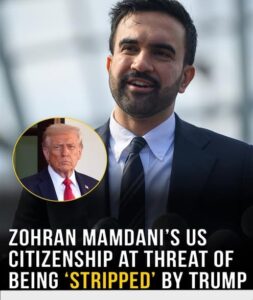Zohran Mamdani Hit With Deportation Threat From Donald Trump – Just Days After His Historic Win

Zohran Mamdani had barely finished celebrating his groundbreaking New York City mayoral victory when an unprecedented political firestorm erupted around him. Less than a week after becoming the city’s first Muslim mayor-elect, the newly elected leader suddenly found himself the target of something no incoming U.S. mayor has ever faced: the sitting President publicly suggesting he should be stripped of citizenship and removed from the country.
The 34-year-old Democrat won by a wide margin on November 4, defeating Independent challenger Andrew Cuomo and Republican nominee Curtis Sliwa. His victory made history on multiple fronts — the first Muslim, first South Asian, first African-born, and first Millennial to be chosen as mayor of America’s largest city. Many saw his win as a turning point for New York, a signal that voters were ready for bold new leadership.
Even on election night, Mamdani embraced that identity. “If we’re being honest, the pundits never expected someone like me to stand here,” he told his supporters at the Brooklyn Paramount. “I’m young. I’m Muslim. I’m a democratic socialist. And the worst part — at least for some — is that I refuse to be ashamed of any of it.” His crowd roared back, sensing that this moment was larger than one election.
But the moment also became an immediate target.
Back in the Oval Office, Donald Trump wasted no time sharpening his criticism. For Mamdani’s base, the hostility was predictable; for constitutional scholars, it was unheard of; and for Mamdani himself, it simply confirmed the reasons he ran in the first place: to stand up to systems that threaten marginalized communities.
Mamdani’s journey to the mayor’s office began far from New York. Born in Uganda, he immigrated to the U.S. at seven, became a permanent resident, and officially obtained citizenship in 2018 — the milestone that allowed him to launch his political career. Before running for mayor, he represented Queens in the State Assembly, earning a reputation for championing working-class priorities: affordable housing, cheaper childcare, transit improvements, and a rent freeze on stabilized units. His call for free public buses turned him into a symbol for New Yorkers long overlooked by traditional city politics.
Still, no one expected the firestorm that followed.
During his primary night speech in June 2025, Mamdani vowed that if elected, he’d “stop masked ICE agents from deporting our neighbors.” Conservatives reacted instantly — and Trump reacted personally. ABC News reported that Trump’s first response was blunt and shocking: “Well then, we’ll have to arrest him.”
The attacks escalated quickly. Trump began publicly questioning whether Mamdani was even a real citizen, leaning on vague claims that “many people” believed he was in the country illegally. He called him a communist — ignoring Mamdani’s clearly stated democratic socialist views — and made it obvious this was no longer a policy debate. It was an attempt to delegitimize him.
Mamdani took the hits head-on. On X, he wrote that the President of the United States had threatened to “arrest me, revoke my citizenship, place me in a detention camp, and deport me.” He emphasized that none of the accusations involved any actual wrongdoing. “This is meant to warn every New Yorker who refuses to live in fear,” he declared. “We will not be intimidated.”
But the pressure didn’t ease.
As the general election neared, Trump intensified his rhetoric. On Truth Social, he called Mamdani’s potential win “a gift to the Republican Party,” predicting unprecedented conflict between City Hall and Washington. He threatened to block federal funding and mocked Mamdani’s policy goals as “fake communist fantasies.”
Then the situation escalated to a new level.
Tennessee Congressman Andy Ogles issued a statement demanding a federal investigation into Mamdani’s citizenship. He accused him — without evidence — of lying on his naturalization forms and claimed he had links to communism and “terroristic ideology.” Ogles said that if any of this were proven, Mamdani should be put “on the next plane to Uganda.”
Legal experts immediately pushed back. PolitiFact and immigration scholars noted that absolutely no credible evidence supported the allegations. They emphasized that revoking citizenship is only possible through the courts — and only with clear proof of fraud. As one legal expert bluntly explained: “You cannot deport someone because you dislike their politics.”
But the attacks didn’t stop, because this battle had never been about legality. It was about identity, power, and who is allowed to lead in today’s America.
Now, instead of entering office with a grace period, Mamdani steps into City Hall under a national spotlight — and a political storm. His platform has reshaped expectations for city leadership, while his identity — Black, Muslim, Ugandan-born, proudly left-wing — has become a flashpoint in the wider culture war. To his supporters, he represents the future of New York. To his critics, he represents everything they want to resist.
Mamdani knows exactly what he represents.
On election night, he delivered a message not just to Trump, not just to Ogles, but to anyone who hoped fear would silence the communities that elected him. “If they want to come for one of us,” he said, “they’re going to have to go through all of us.”
It wasn’t subtle. It wasn’t meant to be.
Whether this confrontation becomes a defining national fight or the opening round of a long political struggle, one thing is clear: New York chose Zohran Mamdani with full knowledge of who he is — and he intends to govern with the same unapologetic resolve that brought him to victory.